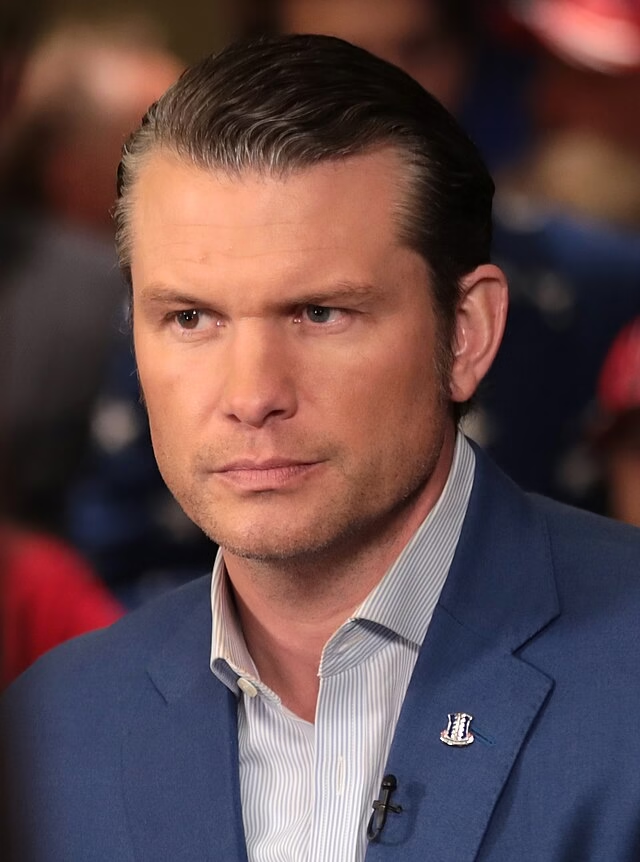In a significant political development, Pete Hegseth, a former Fox News host and Army National Guard veteran, has been confirmed as the U.S. Secretary of Defense. The decision came after a narrow 51-50 Senate vote, with Vice President J.D. Vance casting the tie-breaking vote. This appointment marks a dramatic shift in the leadership of the Pentagon, introducing an individual with an unconventional background and a controversial track record.
The confirmation of Pete Hegseth has been anything but smooth. His nomination sparked widespread debate across party lines, with some senators voicing serious concerns over his suitability for the role. Allegations of sexual misconduct, alcohol abuse, and his outspoken criticism of diversity and inclusion initiatives in the military fueled opposition to his appointment. Prominent Republican Senators, including Mitch McConnell, Lisa Murkowski, and Susan Collins, broke ranks with their party and joined Democrats in voting against Hegseth’s confirmation. These defections underscored the deep divisions his nomination created, even within his own party. Despite these challenges, Hegseth’s confirmation was ultimately secured, reflecting the unwavering support of President Donald Trump’s administration. It is widely believed that Hegseth’s alignment with the president’s vision for a more aggressive and less bureaucratic Pentagon played a pivotal role in his eventual approval.
Hegseth’s rise to the role of Secretary of Defense has been both remarkable and polarizing. As a Fox News contributor, he became a prominent media personality, often voicing opinions that resonated with the conservative base. His critiques of “wokeness” in the military and emphasis on returning to a “warrior culture” have drawn both praise and criticism. Supporters of Hegseth argue that his leadership style and military background position him as an ideal candidate to address challenges facing the armed forces. They emphasize his commitment to border security, particularly his focus on the U.S.-Mexico border, as a critical national security issue. His advocates also highlight his dedication to streamlining military bureaucracy, which they view as essential to enhancing the effectiveness of the armed forces. On the other hand, detractors worry about the potential consequences of Hegseth’s polarizing views. Critics argue that his stance on diversity initiatives could alienate key segments of the military, undermining cohesion and morale. Additionally, his lack of traditional defense leadership experience raises questions about his ability to navigate the complexities of global military strategy and diplomacy.
Vice President J.D. Vance’s role in Hegseth’s confirmation cannot be overstated. His tie-breaking vote in the Senate underscored the razor-thin margins that defined the process. Vance, a staunch ally of the administration, defended Hegseth’s nomination, framing it as a necessary step to ensure the military’s readiness and effectiveness in an increasingly volatile world. Vance’s support for Hegseth reflects the administration’s broader priorities, which include a strong emphasis on national sovereignty, military strength, and border security. The vice president’s active involvement in securing Hegseth’s confirmation signals the importance the administration places on reshaping the Pentagon’s leadership to align with its policy goals.
Hegseth’s appointment represents a significant departure from traditional Pentagon leadership. Unlike his predecessors, who often had extensive experience in defense policy and international relations, Hegseth’s background is rooted in his military service and media career. This unique combination has led to both optimism and skepticism about his tenure as Secretary of Defense. Supporters of Hegseth believe that his outsider perspective will bring much-needed reforms to the Pentagon. They argue that his emphasis on eliminating inefficiencies and prioritizing operational readiness will strengthen the military’s overall capabilities. His critics, however, caution that his lack of experience in high-level defense leadership could hinder his ability to manage complex geopolitical challenges.
As Secretary of Defense, Pete Hegseth has outlined an ambitious agenda that reflects the administration’s priorities. One of his primary goals is to reinforce the military’s focus on combat readiness and operational efficiency. This includes reducing bureaucratic red tape and ensuring that resources are allocated effectively to support the armed forces. Hegseth has also emphasized the importance of securing the U.S.-Mexico border, framing it as a national security issue. His approach involves leveraging military resources to enhance border security measures, a stance that has garnered both support and criticism. Proponents view it as a necessary step to address immigration and trafficking concerns, while critics argue that it diverts attention and resources from other pressing military priorities. Another key area of focus for Hegseth is addressing the challenges posed by China and Russia. In his confirmation hearings, he highlighted the need to strengthen the U.S. military’s capabilities to counter these adversaries’ growing influence. This includes modernizing military equipment, investing in cyber defense, and enhancing partnerships with allied nations. However, implementing these priorities will not be without challenges. Hegseth’s critics have raised concerns about his ability to navigate the complexities of international diplomacy and build consensus within the military. Additionally, his outspoken views on cultural and social issues could create divisions within the armed forces, potentially undermining his efforts to enhance cohesion and readiness.
The confirmation of Pete Hegseth as Secretary of Defense has far-reaching implications for the Pentagon and the broader defense community. His appointment reflects the administration’s commitment to reshaping the military’s leadership and policies to align with its vision for national security. Hegseth’s tenure is likely to bring significant changes to the Pentagon’s culture and operations. His focus on eliminating bureaucracy, prioritizing combat readiness, and addressing border security issues signals a shift toward a more aggressive and less traditional approach to defense leadership. At the same time, Hegseth’s polarizing views and lack of traditional defense experience pose risks. His critics warn that his approach could alienate key segments of the military and complicate efforts to address complex geopolitical challenges. How he navigates these challenges will ultimately determine the success of his tenure as Secretary of Defense.
The confirmation of Pete Hegseth as Secretary of Defense marks a historic moment for the Pentagon. His appointment underscores the administration’s willingness to break with tradition and embrace an unconventional approach to military leadership. Whether this approach will yield positive results remains to be seen, but one thing is certain: Hegseth’s tenure will be closely watched by supporters and critics alike. As he takes on the responsibilities of his new role, Pete Hegseth faces the daunting task of leading the U.S. military in an era of unprecedented challenges and uncertainty. From addressing the threats posed by adversaries like China and Russia to navigating the complexities of military culture and policy, Hegseth’s tenure will be a defining chapter in the history of the Department of Defense.






